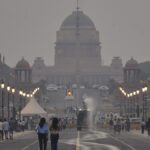
New Delhi recorded an AQI of 290 on October 24, 2025, which falls in the poor category. File
| Photo Credit: PTI
As New Delhi’s air quality deteriorated after Deepavali, pregnant women find themselves gasping for breath in a city engulfed in toxic smog.
For Gazala Jamshed, 31, who is in her final trimester, the past week has been suffocating with air quality swinging between “poor” and “very poor”. “Breathing becomes difficult during pregnancy. It only got worse after Deepavali this year. I am more concerned about how pollution will affect my baby,” she said.
Soon after delivery, Ms. Jamshed plans to travel to her hometown in Uttarakhand, despite the challenges of moving days after a C-section. “Once born, the baby will need oxygen for normal development, so I will ask my doctor when I can travel,” she said.

Ms. Jamshed admits she has even considered leaving Delhi altogether. “I have read studies stating how pollution affects babies’ development. But because of my government job, I cannot relocate,” she said, adding that she now wears a mask whenever she steps out.
Doctors overwhelmed
Gynaecologists across Delhi say that they have seen a surge in pregnant women reporting breathlessness, fatigue, and rising blood pressure — symptoms that can trigger pre-term deliveries.
“During this season, asthma and allergies worsen, and many expectant mothers develop hypertension. Out of 20 patients a day, about half report such issues,” said Dr. Shama Batra, Director of Patel Hospital in East Delhi. She now advises her patients to stay indoors, keep windows tightly shut, and opt for online consultations whenever possible.

Air purifiers and isolation
For Garima Tyagi, 36, who is six months pregnant, Deepavali celebrations brought more anxiety than joy. “I did not step out at all and kept the air purifier on the whole time. Even though the court restricted firecracker use to two days, people continue to burst them. It is worrying because we know this air is not safe for the baby,” she said.
Doctors identify that the elderly, children, pregnant women, and patients with respiratory or cardiac conditions as the most vulnerable to Delhi’s toxic air. “Pregnant women already need more oxygen, and during pollution season, breathing becomes deeper and faster. Pollutants like PM 2.5 and PM 10 can pass through the bloodstream into the placenta, reducing the baby’s oxygen supply,” said Dr. Manju Puri of SGT Hospital, Gurugram.

Medicines a last resort
“In severe cases, the placenta can detach, cut off blood flow and lead to stillbirths,” Dr. Puri explained. “Oxygen deprivation also increases the risk of pre-term births and low birth-weight babies, who are more prone to diabetes and hypertension later in life,” she added.
“In some cases, babies feel suffocated and pass stool in the womb, a sign of distress. That is why we see a spike in C-sections during this season,” she said, adding that studies have also linked high pollution levels to post-partum depression.

Dr Vedika Bali from Birla Fertility and IVF Centre, Lajpat Nagar, stated that many of her patients have reported experiencing breathlessness and a persistent dry cough. “I have had to prescribe medication, which I usually avoid during pregnancy due to possible side effects,” she said.
Published – October 25, 2025 11:17 am IST

